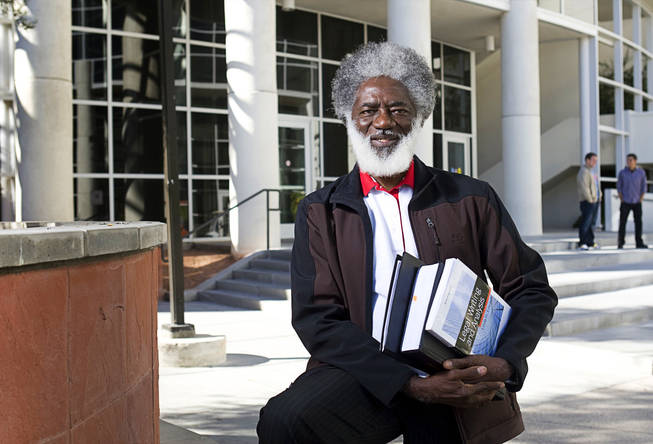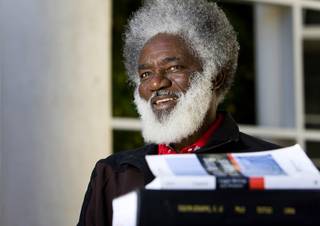
Lawrence Ita, 71, a former presidential candidate in Nigeria, is now a law student at UNLV.
Monday, Nov. 29, 2010 | 2 a.m.
The admissions director at Boyd School of Law guesses that half of the first-year students have held professional jobs.
But surely none quite like Lawrence Eyo Ita.
He has earned doctorates in mechanical and civil engineering and served as a professor at UNLV.
Most of the students were barely toddlers when Ita helped rewrite the constitution in his native Nigeria and participated in the founding of a political party there.
Ita, who turns 71 on Wednesday, is the oldest of the 145 students who entered Boyd this fall. The next oldest is 54.
Some of Boyd’s students are victims of the economy, or were frustrated in old jobs, and are on the hunt for a new career. Ita, who stands out in a crowd because of his full white beard, certainly is not looking for a new career because he can’t find a job. His resume is a jaw-dropper.
“I have never not been a student,” he said. “Even when I was teaching, I was a student. I am involved in the constant search for truths and in the development of capabilities to solve human problems, societal problems.”
After leaving Nigeria in his 20s, he attended the University of Michigan in the 1960s at a time when many college students were preoccupied with protesting the Vietnam War. Not Ita. He was always hitting the books, and it paid off with his engineering doctorate.
He parlayed his degree into jobs in the 1970s as an engineering professor at UNLV and for a brief time as engineering director of what is now known as the state Public Utilities Commission.
Ita returned to Nigeria in the early 1980s because he wanted to get involved in politics, but his timing was off because he had been out of the country for years and was therefore considered an outsider. The West African nation, which gained independence from Great Britain in 1960, is a multiparty democracy whose government has been interrupted by a series of military coups. It was one of those coups that provided an opening for Ita, because the new leaders wanted to pursue a democracy with young, fresh politicians.
Seeing an opening, Ita, who had become general manager of a water agency, was elected in 1989 to the Nigerian Constituent Assembly, a body of 300 members who rewrote Nigeria’s constitution. While there he also became a founder of a political party, the Liberal Convention, which eventually merged into a larger party. It was Ita who came up with the name Liberal Convention.
“We wanted transparency in government, full representation for all parts of the country, more of a liberal philosophy on issues affecting segments of society,” Ita said. “I liked the idea of liberal because it allows everyone to have a say. And I wanted to get away from the name “party,” and convention sounded to me like something that would bring everybody together.”
Ita eventually took a stab at Nigeria’s presidency, but his candidacy in 1998 was marred by illness, and he returned to Southern Nevada. He resumed his career in academia, serving as a professor at what is now known as the College of Southern Nevada and helping to design a way for instructors to offer coursework to students over the Internet.
He also found time to take classes in computer programming and in 2007 earned his second doctorate, this time in education leadership from UNLV.
And he self-published a book, “Life’s Experiences, Science & The Name of God,” which explores the relation between science and prayer.
His pursuit of a law degree, he said, involves his quest to learn about international business transactions, treaties and other instruction that can help him reform Nigeria’s democracy. One change he seeks is to have ballot results posted on a wall at each ward where votes were cast.
“The ballot boxes now are transported to a higher level, like a county, and it’s in that process that boxes disappear, boxes are exchanged,” Ita said. “By the time you get to the final entry, like a presidential election at the national level, the results don’t mean anything.”
His proposal sounds simple, he said, but he realizes it will take much persuasion for those in power to hold more transparent elections and to add transparency to other government functions, including the awarding of public works contracts. Ita plans to hone those skills at Boyd.
“Out of the training and persuasive discourse, law school definitely instills that discipline,” he said.


Join the Discussion:
Check this out for a full explanation of our conversion to the LiveFyre commenting system and instructions on how to sign up for an account.
Full comments policy